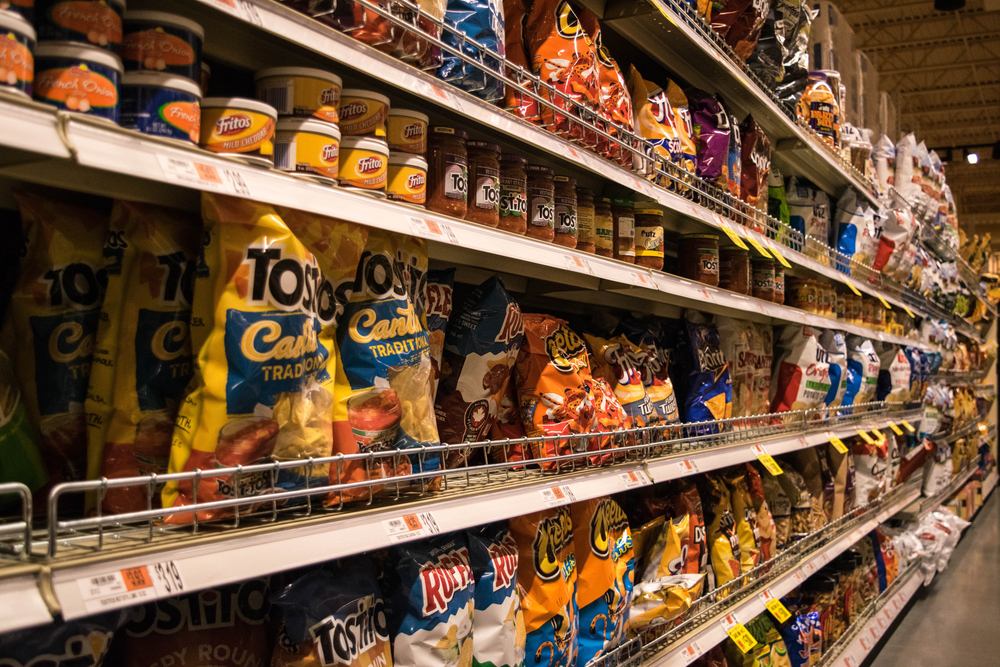Part of the Food Policy Snapshot Series
Policy name: Oaxaca junk food ban for minors
Overview: The state of Oaxaca in Mexico has banned the sale and advertising of sugary drinks and highly processed foods to youth.
Location: Oaxaca, Mexico
Population: 4.1 million (in 2018)
Food policy category: Nutrition, preventive health care
Program goals: To reduce childhood obesity and rates of Type 2 diabetes
How it works: Retailers in Oaxaca are now prohibited from selling or promoting processed snacks such as candy, chips, and soda to children under the age of 18, putting them in the same category as alcohol and cigarettes. Youth who wish to purchase one of the banned items will be told they must have a parent present.
Store employees who do not comply with the new policy will be subject to punishments including fines and potential jail time.
The ban also applies to school vending machines.
Progress to date: The ban was passed in early August 2020. It is too soon to know how much, if any, progress has been made.
Why it is important: In early 2020, the Organization for Economic Cooperation and Development (OECD) made a call to action to reduce overweight and obesity in Mexico. Approximately 73 percent of the Mexican population is overweight or obese. Overweight or obesity rates among children are 35.6 percent for those aged five to 11 and 38.4 percent for those aged 12 to 19. Oaxaca has the highest childhood obesity rates in Mexico.
UNICEF Mexico reports that Mexico is the largest consumer of ultra-processed products in Latin America, and preschool-aged children receive about 40 percent of their caloric intake from these items. Mexicans are also the largest consumers of soda in the world. A childhood obesity specialist in Mexico stated that 10 percent of babies under six months old in Mexico are fed soda regularly, and up to 80 percent of two-year-olds regularly drink soda.
Sugar-sweetened beverages and highly processed foods contribute to weight gain, overweight and obesity, which are precursors to many chronic and potentially fatal illnesses, such as diabetes, high blood pressure, high cholesterol, heart disease, stroke, sleep apnea, and mental illness.
Obesity is also associated with a higher severity of illness among COVID-19 cases. As Mexico has the fourth highest death toll from COVID after the United States, Brazil, and India, the junk food ban comes at a time when Mexican officials are trying to find innovative ways to curb the incidence and severity of COVID cases across the country.
Program/Policy initiated: The junk food ban was introduced in August 2020.
Point of contact: N/A
Similar practices: In 2014, Mexico instituted a soda tax with positive results, although local lawmakers believe it has not done enough to reduce obesity. In October 2020, a new front-of-package labeling law designed to inform consumers about the poor nutritional content of certain foods also went into effect. Since Oaxaca’s junk food ban was announced, several other Mexican states including Tabasco, Chihuahua, and Mexico City, have proposed their own similar bills to combat childhood obesity.
Evaluation: No formal evaluation has been completed to date.
Learn more:
- Childhood Obesity in Mexico: A Critical Analysis of the Environmental Factors, Behaviours and Discourses Contributing to the Epidemic (Health Psychology Open)
- Facts and Figures on Childhood Obesity (World Health Organization)
- Intake of Sugar-Sweetened Beverages and Weight Gain: A Systematic Review (The American Journal of Clinical Nutrition)
- Mexican States Ban Sale Of Junk Food To Minors (NPR)
- Obesity and Overweight (World Health Organization)
- Obesity in Mexico: Rapid Epidemiological Transition and Food Industry Interference in Health Policies (The Lancet Diabetes and Endocrinology)
References:
- Adult Obesity Causes & Consequences (Centers for Disease Control and Prevention)
- Eating Highly Processed Foods Linked to Weight Gain (National Institutes of Health)
- Encuesta Nacional de Salud y Nutrición 2018 Presentación de Resultados (Instituto Nacional de Estadística y Geografía)
- Get the Facts: Sugar-Sweetened Beverages and Consumption (Centers for Disease Control and Prevention)
- Implementation of the New Mexican Regulation for Front-of-Package Nutrition Label (United States Department of Agriculture Foreign Agricultural Service)
- Launch of the Study: “The Heavy Burden of Obesity: The Economics of Prevention” (Organization of Economic Cooperation and Development)
- The Mexicans Dying for a Fizzy Drink (BBC News)
- Mexico Moves to Ban Junk Food Sales to Children, Citing Obesity as Coronavirus Risk Factor (The Washington Post)
- Mexico Obesity: Oaxaca Bans Sale of Junk Food to Children (BBC News)
- Mexico’s Oaxaca State Bans Sale of Junk Food to Children (Reuters)
- More States Follow Oaxaca’s Lead and Move to Ban Junk Food Sales to Kids (Mexico News Daily)
- Oaxaca Junk Food Ban a Good Start in Deconstructing Candy Culture (Mexico News Daily) Obesity, Race/Ethnicity, and COVID-19 (Centers for Disease Control and Prevention)
- Tabasco to Follow Oaxaca’s Lead, Prohibit Junk Food Sales to Minors (Mexico News Daily)
- Taxes Trimmed Mexican Soda Consumption for Two Years (Reuters)
- Tracking Coronavirus’ Global Spread (CNN)
- What Are We Waiting For? (UNICEF)


